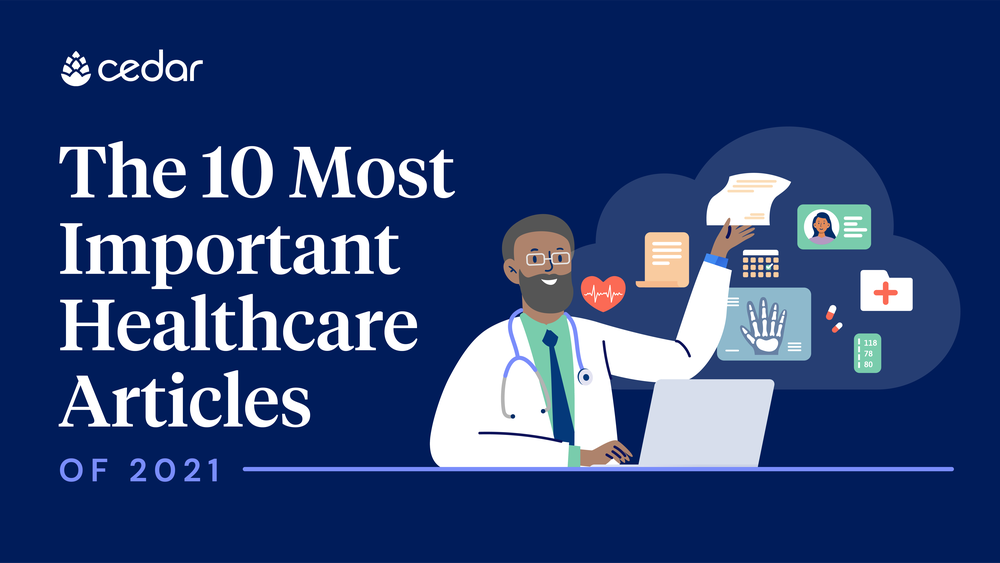Healthcare was truly at the center of our news in 2021. It seemed to work its way into almost every headline, story and social post that we came across over the last year.
Much of this coverage traced back to the pandemic, reshaping how we live, shop, travel and work. There’s a reason Merriam-Webster named “vaccine” their word of the year. With the added attention, patients and consumers became more invested in the state of healthcare, which was reflected in the quality and quantity of news at our disposal.
Here are 10 important stories worth your time.
1. A Timeline of COVID-19 Vaccine Developments in 2021 (AJMC)
The big news of vaccines being approved from Pfizer, Moderna and others led to excitement around the world that life might return to normal soon. With the vaccine rollouts over the next several months, another major story, of course, was the “anti-vaxxer” movement and its effects on our work lives, socializing, dining, retail, travel, education and more.
2. Americans’ Medical Debts Are Worse Than Was Known, Totaling $140 Billion (NYTimes)
A study in JAMA revealed that Americans owe nearly twice as much medical debt as was previously known, with collection agencies $140 billion in unpaid medical bills.
3. Why Healthcare Workers Are Quitting In Droves (The Atlantic)
Early in 2020, there was a huge effort to appreciate frontline workers. But when the marketing campaigns faded and the pandemic raged on, healthcare workers still had to deal with daily suffering, anger and confusion. Many ended up quitting their jobs. And if things don’t change, many more may follow suit.
4. New Rule on Surprise Billing Aims to Take Patients Out of the ‘Food Fight’ (NYTimes)
Congress passed a bill to ban surprise medical bills, with the new law taking effect in 2022. Surprise billing has long been one of the most frustrating and confusing practices in U.S. medicine, harming millions of Americans each year. What remains to be seen is how effectively the new ban can be adhered to and enforced within the industry.
5. The Big Tech in Healthcare Report: How Facebook, Apple, Microsoft, Google & Amazon Are Battling for the $8.3T Market (CB Insights)
Powerful tech companies, including Amazon, Apple and Google, have been making major investments in healthcare—through partnerships, M&A deals and product launches involving AI in healthcare, such as Apple’s new wellness-focused innovations in the Apple Watch and Alphabet’s purchase of Fitbit for $2.1 billion. These companies bring innovative technology and a consumer-centric mindset to the industry. How will they reshape healthcare, and can they actually take on this vastly complex and fragmented industry?
6. Racial Equities Persist in Healthcare Despite Expanded Insurance (NYTimes)
The view of racial and ethnic inequality in U.S. healthcare is a dismal one, including poor care experiences, health outcomes, discrimination, and a lack of affordability. The good news is that there has been greater attention lately on these disparities, why they are so critically important and how healthcare organizations might begin to address them.
7. Top 10 Emerging Trends in Healthcare for 2021: The New Normal (AHA)
Perhaps the biggest trend in any industry has been one of disruption, but this has been especially true in healthcare. In some ways, disruption has been a silver lining of the pandemic, with a greater focus on improving collaboration, supply chains, staffing efficiencies, alternate modes of care delivery, workforce diversity, safety issues and more.
8. How to Negotiate Your Medical Bills and Debt With Your Hospital (WSJ)
With more focus on putting patients in the driver’s seat of their care experience—and tackling out-of-control, often arbitrary medical costs—there was also more attention paid to empowering patients and consumers around resolving their medical payments. Here’s how individuals can learn to advocate for themselves.
9. U.S. Healthcare Costs a Lot, and Not Just in Money (The Incidental Economist)
A study in HSR (Health Services Research) revealed that skyrocketing costs aren’t the only barriers to healthcare. Our complex, confusing, error-riddled system has also created administrative obstacles. For patients, this burden impacts scheduling appointments, obtaining crucial information from insurers and providers, getting prior authorizations, resolving billing issues and more. The result: More patients are delaying or even avoiding care.
10. How Hospitals Can Help Patients and the Planet (NYTimes)
With climate change becoming an increasingly urgent crisis to tackle, healthcare systems around the country are dealing with difficult challenges. What can doctors do when wildfires, floods and other natural disasters threaten their ability to provide care? How can healthcare organizations remain resilient?



